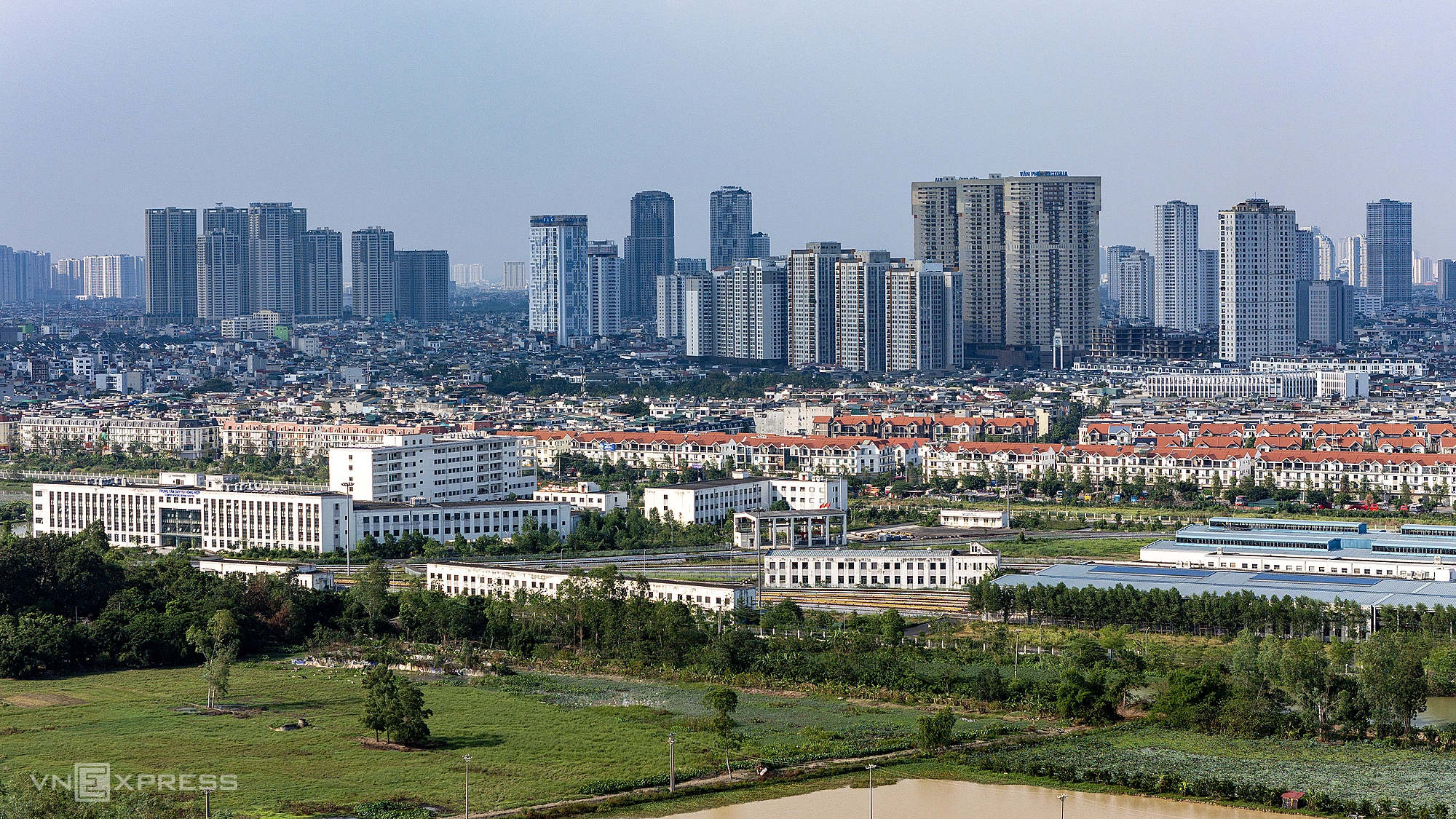A year ago, after renovating her parents' house, Oanh had 300 million VND in savings, just enough for a 20% down payment on a 35 m2, one-bedroom apartment in Thu Duc University Village. At the time, the developer offered a guaranteed rental income of 9 million VND per month for two years, easing her financial burden.
Working in real estate, Oanh has witnessed firsthand the soaring housing prices in recent years. Homeownership has become increasingly out of reach for many, especially young people. "If I don't buy now, I don't know when I'll have another chance," Oanh thought.
She borrowed an additional 1.3 billion VND to fully pay for the apartment. Oanh made the entire purchase independently, without financial support or guidance from her family. "When I told them my plan, my parents tried to dissuade me, fearing I would lose money," she recounted.
 |
Phuong Oanh received the handover of her apartment on 10/9 at a project in Thu Duc University Village. Photo: Provided by the interviewee |
Phuong Oanh received the handover of her apartment on 10/9 at a project in Thu Duc University Village. Photo: Provided by the interviewee
Lam Tuan, 23, from Hanoi, also recently became the owner of a 4.5 billion VND apartment in the Diplomatic Corps area. Tuan said that since high school, his father and older brother had guided him in stock and gold investments. In his freshman year of finance, he worked and invested simultaneously, earning an average of 50 million VND per month. After over five years of saving, Tuan had accumulated 3 billion VND.
One day, his father gave him one billion VND and said, "This is capital for your venture; it's okay if you lose it all." After consulting with financial experts, the 23-year-old chose to buy a home with an installment plan. "Real estate is also a potential investment channel. Buying a house provides me with both a place to live and the potential for future profits, especially with recent price increases," Tuan explained. "My decision surprised even my father."
Tuan and Oanh represent the 25-35 age group of homebuyers, "accounting for over 40% of transactions, according to data from the Vietnam Real Estate Brokers Association (VARS) since 2019. "In some projects, young customers account for up to 70%, surpassing previous generations," the VARS report stated.
A survey by One Mount Group shows that while the main group of homebuyers is currently aged 35-44, the 18-34 age group also accounts for a significant portion, with over 27% of home purchases, clearly reflecting a younger trend. Another 2023 survey by PropertyGuru also points to a shift in homeownership age: the 22-26 group increased from 13% in 2021 to 19% in 2023, the 27-30 group increased from 39% to over 42%, while older age groups gradually decreased.
"Young people are becoming a dominant force in the apartment market," said real estate expert Le Quoc Kien (Ho Chi Minh City). "There are four main reasons for this shift."
First, young people have more diverse and faster earning opportunities than ever before. While previous generations often had to work for many years and reach management positions to have a stable income and consider buying a house, today's youth leverage technology, e-commerce, digital content creation, or digital asset investments to secure substantial financial resources early on.
Gen Z also has a better foundation in personal finance. Many understand early on that buying a house is not just for living but also a form of investment for the future.
Second, credit and sales policies are more flexible than before. Banks offer many preferential loan packages for young people, and developers divide payment schedules into smaller installments, combined with support for loans for future projects. This allows young customers easier access to housing instead of having to accumulate a large sum of money upfront.
Third, young people's home-buying preferences differ from previous generations. They are willing to move to suburban areas, prioritizing reasonably priced apartments with good transport links and modern amenities, rather than saving for a long time to buy a house in the city center. Diverse projects with modern designs have brought the dream of homeownership closer to young people.
"An equally important reason is that many young people receive support from their families. Parents of Gen Z belong to the 7X-8X generation, who have better savings and are willing to support their children in buying a house when they study or work in urban areas," Kien said.
Phuong Oanh shared that her clients are mainly from the 9X generation, especially those born between 1995 and 1998. Last month, she closed a deal for a male customer born in 2001, working in IT. "He has his own company with a fixed monthly income of up to 200 million VND. When he came to me, he immediately bought the two largest apartments in the project, each costing 2.6 billion VND," Oanh said.
These young clients have inspired her to strive harder. When she decided to buy her apartment, Oanh planned to pay off the debt in two years. However, the pressure of debt became a strong motivator, helping her repay the loan in just one year.
 |
Lam Tuan in the living room of his apartment in 9/2025. Photo: Anh Dao |
Lam Tuan in the living room of his apartment in 9/2025. Photo: Anh Dao
While the number of young homebuyers has been steadily increasing in recent years, Phuong Oanh acknowledges that homeownership remains out of reach for most because "income growth has not kept pace with real estate price increases."
Data from the Vietnam Real Estate Market Research Institute (VARS IRE) shows that in Quarter II of 2025, the apartment price index in Hanoi and Ho Chi Minh City increased by 87.7% and 48.3% respectively compared to 2019.
Average per capita income in Hanoi from 2014 to mid-2025 increased by an average of 6.4% per year. Meanwhile, the average apartment price increased twice as fast, at an average of 11.7% per year, from 25 million VND to 75.5 million VND per m2.
In this context, according to Doctor of Finance Vu Dinh Anh, young people who want to buy a house need a "foothold," namely financial leverage. The government has many policies prioritizing homeownership for people under 35, including credit packages with preferential interest rates, such as the 145,000 billion VND package with the participation of 9 major banks.
Ms. Dang Thu Thuy, a representative of Agribank, also informed that the bank is implementing a 10,000 billion VND social housing loan package for young people under 35, with a 6% interest rate and the possibility of borrowing up to 100% of the apartment value. Agribank also launched a 10,000 billion VND commercial housing loan package for people under 35 in 4/2025, with a fixed interest rate of 5.5% per year for the first three years and a loan term of up to 40 years.
By 6/2025, this package had 710 young borrowers, with a total disbursed capital of 1,600 billion VND.
However, according to Doctor Nguyen Tri Hieu, the biggest risk for customers, especially young people, is their ability to repay the loan. "When the loan ratio reaches 70-80% of the apartment value, or even 100%, the higher the leverage, the greater the risk for both the borrower and the bank," the expert said.
The expert suggests that banks should guide young people in using financial leverage wisely, with long-term income projections and maintaining a safe loan ratio of around 50%.
Concurring, expert Le Quoc Kien also advises young people not to borrow more than 50% of the asset value, with monthly payments not exceeding 40% of their income. "When borrowing, don't just look at the preferential interest rates for the first few years or the grace period; calculate carefully for when the promotions end," he said.
 |
Real estate in central Hanoi. Photo: Giang Huy |
Real estate in central Hanoi. Photo: Giang Huy
Loan repayment ability is also what Lam Tuan wants to address. He shares a lesson from his own experience: even though he only borrowed 500 million VND, paying 4 million VND per month in principal and interest, there was a time when he struggled. It was in 2022, when floating interest rates caused his monthly payments to rise to 5.7 million VND. At the same time, the stock market plummeted, leaving his income near zero.
"That's when I really felt the pressure," Tuan recalled. He then rented out the apartment to "sustain" itself. After more than two years, the debt was finally paid off.
As for Phuong Oanh, after receiving the keys to her apartment, she also signed a two-year lease agreement. The end of the lease coincides with her younger sister's university enrollment.
"At that time, the two of us will have a safe place to call home in the city, no longer worrying about housing," she shared.
Phan Duong












